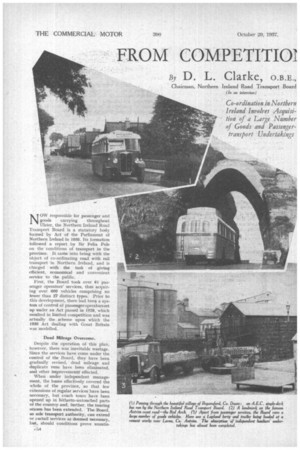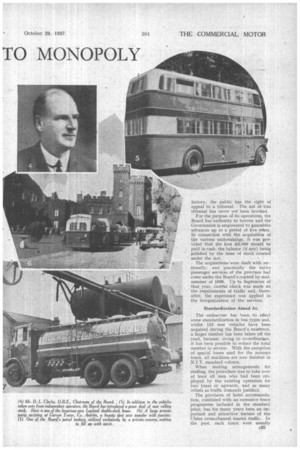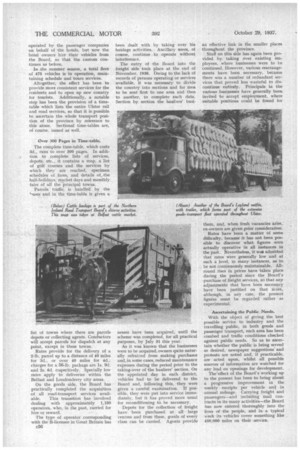FROM COMPETITIU TO MONOPOLY
Page 116

Page 117

Page 118

If you've noticed an error in this article please click here to report it so we can fix it.
By D. L. Clarke, 0.B.E.,
Chairman, Northern Ireland Road Transport Board
(In an interview)
NOW responsible for passenger and goods carrying throughout Ulster, the Northern Ireland Road Transport Board is a statutory body formed by Act of the Parliament of Northern Ireland in 1935. Its formation followed a report by Sir Felix Pole on the conditions of transport in the province. It came into being with the object of co-ordinating road with rail transport in Northern Ireland, and is charged with the task of giving efficient, economical and convenient service to the public.
First, the Board took over 81 passenger operators' services, thus acquiring over 600 vehicles comprising no fewer than 27 distinct types. Prior to this development, there had been a system of control of passengeroperators set up under an Act passed in 1928, which resulted in limited competition and was actually the scheme upon which the 1930 Act dealing with Great Britain was modelled.
Dead Ardeage Overcome.
Despite the operation of this plan, however, there was inevitable wastage. Since the services have come under the control of the Board, they have been gradually revised, dead mileage and duplicate runs have been eliminated, and other improvemeniA effected.
When under independent management, the buses effectively covered the whole of the province, so that few extensions of regular services have been necessary, but coach tours have been opened up in hitherto-untouched parts of the country and, further, the touring season has been extended. The Board, as sole transport authority, can extend or curtail services as deemed necessary, hut, should conditions prove unsatis
c:i4 factory, the public has the right of appeal to a tribunal. The aid of this tribunal has never yet been invoked.
For the purpose of its operations, the Board has authority to borrow and the Government is empowered to guarantee advances up to a period of five years. In connection with the acquisition of the various undertakings, it was provided that the first £5,000 should be paid in cash, the balance (if any) being satisfied by the issue of stock created under the Act.
The acquisitions were dealt with sectionally, and practically the entire passenger services of the province had come -under the Boards control by midsummer of 1,936. Up to September of _ that year, careful check was made on the requirements of traffic and,-thereafter, the experience was applied in the reorganization of the services.
Standardization Aimed At.
The endeavour has been to effect some standardization in bus types and, whilst 123 new vehicles have been acquired during the Board's existence, a larger number has been taken off the road, because, owing to co-ordinatipri. it has been possible to reduce the total number in service, With the exception of special buses used for the autumn tours, all machines are now finished in N.I.T. standard colours.
When making arrangements for staffing, the procedure was -to take over at least all men who had been employed by the existing operators for two years or upwards, and as many others as traffic demands justified.
The provision, of hotel accommodation, combined with an extensive tours programme included in the standard price, has for many years been an important and attractive feature of the Ulster cross-channel tourist traffic. In the past, such tours were -usually operated by the passenger companies on behalf of the hotels, but now the hotel owners hire their vehicles from the Board, so that the custom continues as before.
In the summer season, a total fleet of 475 vehicles is in operation, maintaining schedule and tours services.
Altogether, the effect has been to provide more consistent services for the residents and to open up new country for tourists. Additionally, a notable step has been the provision of a timetable which lists the entire Ulster rail and road services, so that it is possible to ascertain the whole transport position of the province by reference to this alone. Sectional time-tables are, of course, issued as well.
Over 300 Pages in Tune-table.
The complete time-table, which costs 3d., runs to over 300 pages. In addition to complete lists of services, depots, etc., it contains a map, a 'list of golf courses and the services by which they are reached, specimen schedules of fares, and details of ,the half-holidays, market days and monthly fairs of all the principal towns.
Parcels trafficis handled by the 'uses and in the time-table is given a list of towns where there are parcels depots or collecting agents, Conductors will accept parcels for dispatch at any point, except in these towns.
Rates provide for the delivery of a 2-1b. parcel up to a distance of 40 miles for 3d., or over 40 miles for 4d.; charges for a 56-1b. package are is. 9d. and 2s. 6d. respectively. Specially low rates apply to deliveries within the Belfast and Londonderry city areas.
On the goods side, the Board has practically completed the acquisition of all road-transport services avail able. This transition has involved dealing with approximately 1,100 operators, who, in the past, carried for hire or; reward.
The type of operator corresponding with the B-licensee in Great Britain has c56 been dealt with by taking over his haulage activities. Ancillary users, of course, continue to operate without interference.
The entry of the Board into the freight side took place at the end of November, 1936. Owing to the lack of records of persons operating or services available, it was necessary to divide the country into sections and for mea to be sentfirst to one area and then to another, to complete such data. Section by. section the hauliers' bus.
nesses have been acquired, until the scheme was completed, for all practical purposes, by July 31 this year.
As it was known that the businesses were to be acquired, owners quite naturally refrained from making purchases and, in some cases, reduced maintenance expenses during the period prior to the taking-over of the hauliers' section. On the appointed day in each district, vehicles had to be delivered to the Board and, following this, they were given a careful examination. If possible, they were put into service immediately, but it has proved more usual for reconditioning to be necessary.
Depots for the collection of freight have, been purchased at all • large centres and from these, goods of every class can be carried. Agents provide an effective link in the smaller places throughout the province.
Staff on this aide has again been provided by taking over existing employees, where businesses were to be continued. However, various rearrangements have been necessary, because there was a number of redundant services that proved less wasteful to discontinue entirely. Principals in the various businesses have generally been invited to accept employment, where suitable positions could be found for them, and, when fresh vacancies arise, ex-owners are given prior consideration.
Rates have been a matter of some difficulty, because it has not been possible to discover what figures were actually operative in all instances in the past. Nevertheless, it was admitted that rates were generally low and at such a level, in many instances, as to be not continuously maintainable. Allround rises in prices have taken place during the period since the Board's purchase of freight services, so that any adjustments that have been necessary have been justified on that score, although, in any case, the present figures must be regarded rather as experimental.
-Ascertaining the Public Needs.
With the object of giving the best possible service to industry and the travelling public, in both goods and passenger transport, each area has been combed and traffic conditions checked against public needs. So as to ascertain whether the public is being served as desired, newspaper suggestions and protests are noted and, if practicable, are acted upon, whilst all possible sources of information are watched for any lead on openings for development.
The effect of the Board's' working up to the present has been to bring about a progressive improvement in the weekly receipts per vehicle and in annual mileage. Carrying freight and passengers—and including mail contracts in its many activities—the Board has now entered thoroughly into the lives of the people, and in a typical week its vehicles cover something like 450,000 miles on their •service.
























































































































































































